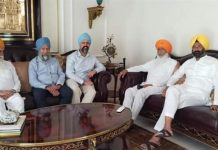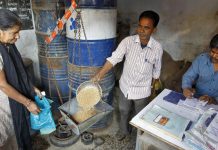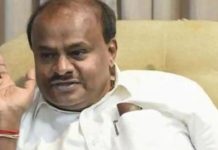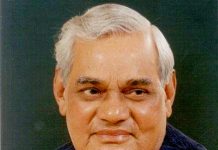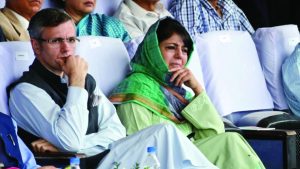 November 21 was a day of hectic political high drama in the Valley with the PDP, NC and the Congress joining hands to form the new government in Jammu and Kashmir. The ball was set rolling by the previous day’s press conference by the top PDP leader Muzaffar Hussain Beigh in which he declared his support for a possible third front headed by Sajad Gani Lone. But before Beigh’s announcement could be followed up with the possible defection of the other PDP MLAs, the grand-alliance among the PDP, NC and the Congress came along to pre-empt it.
November 21 was a day of hectic political high drama in the Valley with the PDP, NC and the Congress joining hands to form the new government in Jammu and Kashmir. The ball was set rolling by the previous day’s press conference by the top PDP leader Muzaffar Hussain Beigh in which he declared his support for a possible third front headed by Sajad Gani Lone. But before Beigh’s announcement could be followed up with the possible defection of the other PDP MLAs, the grand-alliance among the PDP, NC and the Congress came along to pre-empt it.
By the late afternoon, the PDP leader Mehbooba Mufti dashed the letter to Governor Satya Pal Malik staking claim to government formation. But the fax machine at the Governor’s office wouldn’t receive it. Mehbooba posted the letter on her Twitter account, urging the governor to receive it. She also revealed that she had tried to call the governor but the phone didn’t go through. Meanwhile, her rival Sajad Gani Lone too tweeted a letter staking claim to form a BJP-supported government which too had not been received by the Governor’s fax machine.
Within an hour or so of the two letters going public, Governor issued an order dissolving the Assembly. He later controversially explained that his decision was forced by the “impossibility of forming a stable government” in the state given that the three parties had divergent ideologies. He also referred to the fragile security scenario in the state to say there was a need to have a stable and supportive environment for security forces which according to him, a coalition government couldn’t provide. Malik said that election was the best
option in the current situation.
“Dissolution of the Assembly is the best course of action… to provide stability and security to the state and hold elections at an appropriate time so that a government with a clear mandate is duly formed,” Malik said. He expressed serious doubts about the claims to government formation where there were competing claims of the majority.
The Governor also denied receiving the letters from Mehbooba and Sajad, saying his office was closed in view of the Eid-e-Milad-un-Nabi and that there was no one even to give him food. However, there are fewer buyers in Kashmir or at the national level for such explanations.
At the same time, the events of November 21 were about the two sides separately trying to form the government and also aborting each other’s bids at doing so. Neither of them succeeded in forming the government but they duly pre-empted each other from doing it.
Lone who was trying to break up the PDP for the past five months to form a government with the support of the BJP didn’t succeed in doing so — albeit, now he claims he had the numbers to prove his majority in the Assembly. And Mehbooba received the support of the NC and Congress in time to foil Lone’s ambitious bid.
For the grand alliance the basic objective was to ensure Lone didn’t make the government by breaking any of their parties. And this was possible only through conveniently joining hands to form a government or force the dissolution of Assembly, which they finally did. And Mehbooba duly hinted at this success in her tweet: “I would like to express my heartfelt gratitude to Omar Abdullah and Ambika Soni for helping us achieve the seemingly impossible”.
Democracy the loser
Speaking at pre-convocation academic conclave of ITM University in Gwalior the Governor Malik defended his decision to dissolve the Assembly saying had he looked towards New Delhi for instructions, he would have had to install Sajad Lone as the Chief Minister. “Therefore, I ended up the matter. Whosoever wants to say anything, can do so now but I am convinced that whatever I did, was right,” Malik said in his address after noted journalist Ravish Kumar referred to faulty fax machine in his speech.
The Governor talked of the possibility of the horse-trading and the money exchanging hands if he had allowed either of the competitive bids for power to succeed.
Malik draws a picture of an interesting triangular tussle and coordination among three power centres about who should rule the state – central government, Governor and the political parties. Ironically, the political parties whose mandate in an election should have logically dictated who rules the state are the weakest of the power centres. Both Omar Abdullah and Mehbooba Mufti praised the Governor for not listening to New Delhi and doing his own thing by dissolving the Assembly. But the point had been made. Without New Delhi assent, no government could be made in Jammu and Kashmir.
Nowhere to go
The dissolution of the Assembly has paved way for the Assembly elections in the state. As of now Jammu and Kashmir is busy holding the panchayat polls. Municipal elections which were held earlier were largely boycotted but the panchayat polls have witnessed a reasonable participation of the people. It is now likely that the Assembly polls would be held together with the parliament election next year. Even the BJP has supported this idea. “We wish that the Assembly elections in Jammu and Kashmir should be conducted along with the Parliament elections,” BJP State president Ravinder Raina said
after Governor dissolved the house.
This leaves Lone on his own. And the other parties too. The post dissolution politics of the PDP, NC and the Congress has indicated that the grand alliance was only a tactical, ad hoc measure which fulfilled its objective. The PDP has baulked at challenging the Governor’s dissolution of the Assembly in the court. The NC has made it clear it won’t ally with the PDP in the Assembly and parliament election. Similarly, while Congress has said it would support the PDP in case it goes to court, the party is silent on a coalition with the PDP. “The only glue among the parties was to pre-empt the attempts to break them and prevent the formation of a government constituted of the defecting MLAs. This has been achieved,” says the political commentator Naseer Ahmad. “There is no political imperative for them to
remain together”.
On the contrary, there is much to lose. The NC fears its alliance with the PDP in the polls would work to its detriment. The PDP’s coalition with the BJP and the killings and blindings of people under its watch in 2016 have discredited the party to an extent where no Kashmir based party wants to be seen as its ally. This much was even admitted by Mehbooba’s one-day ally Omar Abdullah during his press conference after the dissolution of Assembly. “I was advised against allying with the PDP. I was told I was giving a new life to the party,” Omar said. “But I decided to lend my support in the interest of Kashmir. I rose above the political considerations of my own party”.
Going forward thus all Jammu and Kashmir parties will be on their own. Though Lone is likely to be backed by the BJP but this alliance would be more of a liability than a boon in the Valley. So, all bets are off as to who wins the next Assembly election. However, according to a recent India TV-CNX survey, the NC has an edge in the polls. The survey says, NC can win 31 assembly seats, while BJP can win 23 seats, followed by Mehbooba Mufti’s People’s Democratic Party (PDP) which can win 16 seats. Congress has chances of winning only seven seats, with ten seats going to ‘Others’. The existing ground situation in the Valley also endorses this survey. But the outcome would also depend on how many people vote in the election. In case, the election is widely boycotted, it could potentially distort the outcome of the polls which could go in any party’s favour.
letters@tehelka.com








